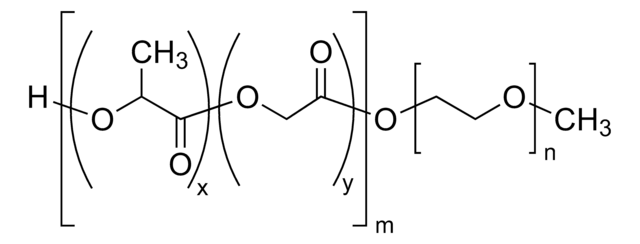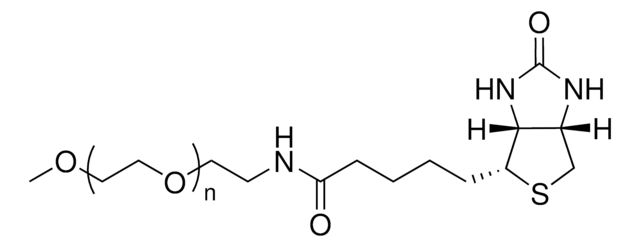Wichtige Dokumente
909882
Biotin-poly(ethylene glycol)-b-poly(lactide-co-glycolide)
PEG average Mn 2,000, PLGA average Mn 10,000, lactide:glycolide 50:50
Synonym(e):
Biotin-PEG-PLGA
About This Item
Empfohlene Produkte
Form
powder or chunks
Zufuhrverhältnis
lactide:glycolide 50:50
Mol-Gew.
PEG average Mn 2,000 (by NMR)
PLGA average Mn 10,000 (by NMR)
Farbe
white to tan
Lagertemp.
−20°C
Anwendung
Lagerklassenschlüssel
11 - Combustible Solids
WGK
WGK 3
Flammpunkt (°F)
Not applicable
Flammpunkt (°C)
Not applicable
Hier finden Sie alle aktuellen Versionen:
Analysenzertifikate (COA)
Die passende Version wird nicht angezeigt?
Wenn Sie eine bestimmte Version benötigen, können Sie anhand der Lot- oder Chargennummer nach einem spezifischen Zertifikat suchen.
Besitzen Sie dieses Produkt bereits?
In der Dokumentenbibliothek finden Sie die Dokumentation zu den Produkten, die Sie kürzlich erworben haben.
Artikel
Professor Robert K. Prud’homme introduces flash nanoprecipitation (FNP) for nanoparticle fabrication, which is a scalable, rapid mixing process for nanoparticle formulations.
Unser Team von Wissenschaftlern verfügt über Erfahrung in allen Forschungsbereichen einschließlich Life Science, Materialwissenschaften, chemischer Synthese, Chromatographie, Analytik und vielen mehr..
Setzen Sie sich mit dem technischen Dienst in Verbindung.







